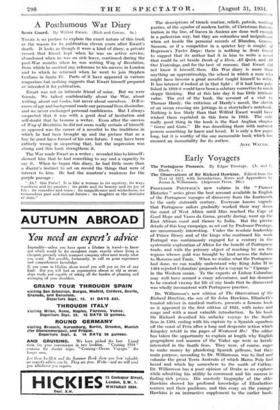Early Voyagers
The Observations of Sir Richard Hawkins. Edited from the Text of 1622, with Introduction, Notes and Appendices by James A. Williamson. (Argonaut- Press. 36s.) PROFESSOR PRESTAGE'S new volume in the " Pioneer Histories " series gives the best account available in English of the Portuguese voyages of discovery from the fourteenth to the early sixteenth century. Everyone knows vaguely
that Portuguese sailors gradually worked their way down the coast of West Africa until Dias reached the Cape of Good Hope and Vasco da Gama, greatly daring, went up the East African coast and thence to India. But the precise details of this long campaign, as set out by Professor Prestage, are uncommonly interesting. Under the resolute leadership of Prince Henry and of the kings who continued his work Portugal was continuously engaged for a century in the systematic exploration of Africa for the benefit of POrtuguese trade, and with the primary object of reaching by sea the regions whence gold was brought by land across the Sahara to Morocco and Tunis. When we realize what the Portuguese had done, we can readily understand why King John II in 1484 rejected Coluinbus' proposalS for a voyage to " Cipango " in the WeStern ocean. To the 'experts at Lisbon Columbus may well have seemed a crazy adventurer, and his demand to be created viceroy for life of any lands that he discovered was wholly inconsistent with Portuguese practice.
Dr. Williamson's new edition of The Observations of Sir Richard Hawkins, the son of Sir John Hawkins, Elizabeth's trusted adviser in nautical matters, presents a famous book as it appeared in the first edition of 1622,. with notes and mapg and with a most Valuable introdUction. In his book Sir Richard described his unlucky voyage to the South Seas in 1594, ending with his capture by a Spanish squadron off the coast of Peru after a long and desperate action which Kingsley retold in the pages of Westward Ho! The editor has taken the opportunity to explain at length why English geographers and seamen of the Tudor age were so keenly interested in the South Seas. They were, of course, eager to make money by plundering Spanish galleons, but their main purpose, according to Dr. Williamson, was to find and colonize the great Terra Australis of which Marco Polo had heard and which lay somewhere to the south of Cathay. Dr. Williamson has a poor opinion of Drake as an explorer while admitting his ability to command and his success in finding rich prizes. His masterly biography. of the elder Hawkins showed his profound knowledge of Elizabethan seamen and their problems, and this essay on the younger Hawkins is an instructive supplement to the earlier book.






































 Previous page
Previous page